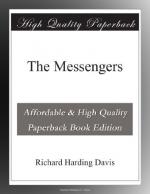The next morning, and for many days after, he was surprised to find that the city went on as though she still were in it. With unfeeling regularity the sun rose out of the East River. On Broadway electric-light signs flashed, street-cars pursued each other, taxicabs bumped and skidded, women, and even men, dared to look happy, and had apparently taken some thought to their attire. They did not respect even his widowerhood. They smiled upon him, and asked him jocularly about the farm and his “crops,” and what he was doing in New York. He pitied them, for obviously they were ignorant of the fact that in New York there were art galleries, shops, restaurants of great interest, owing to the fact that Polly Kirkland had visited them. They did not know that on upper Fifth Avenue were houses of which she had deigned to approve, or which she had destroyed with ridicule, and that to walk that avenue and halt before each of these houses was an inestimable privilege.
Each day, with pathetic vigilance, Ainsley examined his heart for the promised sign. But so far from telling him that the change he longed for had taken place, his heart grew heavier, and as weeks went by and no sign appeared, what little confidence he had once enjoyed passed with them.
But before hope entirely died, several false alarms had thrilled him with happiness. One was a cablegram from Gibraltar in which the only words that were intelligible were “congratulate” and “engagement.” This lifted him into an ecstasy of joy and excitement, until, on having the cable company repeat the message, he learned it was a request from Miss Kirkland to congratulate two mutual friends who had just announced their engagement, and of whose address she was uncertain. He had hardly recovered from this disappointment than he was again thrown into a tumult by the receipt of a mysterious package from the custom-house containing an intaglio ring. The ring came from Italy, and her ship had touched at Genoa. The fact that it was addressed in an unknown handwriting did not disconcert him, for he argued that to make the test more difficult she might disguise the handwriting. He at once carried the intaglio to an expert at the Metropolitan Museum, and when he was told that it represented Cupid feeding a fire upon an altar, he reserved a stateroom on the first steamer bound for the Mediterranean. But before his ship sailed, a letter, also from Italy, from his aunt Maria, who was spending the winter in Rome, informed him that the ring was a Christmas gift from her. In his rage he unjustly condemned Aunt Maria as a meddling old busybody, and gave her ring to the cook.




